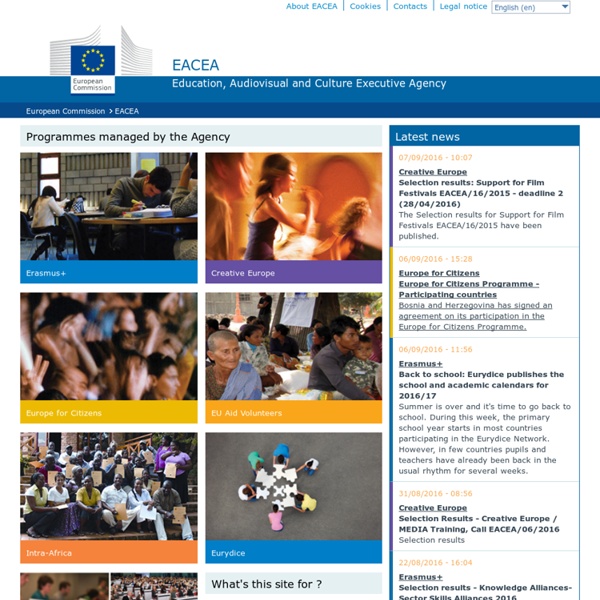



LLP Infodays 2012 Find here: Information on the priorities of the Lifelong Learning Programme Details of what's new to the Programme in 2012 Advice and tips on preparing and submitting a strong proposal, and on managing grants. Session 1 : The Policy Context Top Videos and presentations: Show Hide Session 2 : Submission and Selection Procedures Speaker:Gillian McLaughlin (48 min) (5 min) Session 3 : Parallel sessions on the sectoral /transversal programmes Session 3.1 Leonardo da Vinci Speakers: Stefano di Giusto, Felix Rohn, Vytaute Ezerskiene, Pavol Krempasky, Elisabetta Cannova and Malte Stamer Download the presentation Welcome and introduction (3min) Priorities of 2012 call (29 min) (13 min) Selection of projects: overview of previous selection results (9 min) Selection of projects 2012: Award criteria (17 min) (14 min) Session 3.2 Key activity 3 ICT Speakers: Peter Birch, Godelieve Van Den Brande, Corinne Leveque, Andy Minnion, Umberto Nanni Download the presentation (4min) (2min) Policy context and priorities of 2012 call
Llibreria UE europäische Bildungskooperation, allgemeine und berufliche Bildung, Mobilität und lebenslanges Lernen | Startseite | Aktuelle Meldungen Die Themen und Ziele der europäischen Bildungszusammenarbeit sind weiterhin relevant. Im nächsten Umsetzungszyklus 2012-2014 werden wie bisher lebenslanges Lernen und Mobilität, Verbesserungen der Qualität und Effizienz von Bildung, die Förderung von Gerechtigkeit, sozialem Zusammenhalt und aktiver Bürgerschaft sowie von Kreativität und Innovation im Zentrum der Aktivitäten der Bildungspolitikerinnen und -politiker in Europa stehen. Am 20. Dezember 2011 veröffentlichte die Europäische Kommission ihren Entwurf für den Zwischenbericht über die „Umsetzung des strategischen Rahmens für die europäische Zusammenarbeit auf dem Gebiet der allgemeinen und beruflichen Bildung („ET 2020“) – Die allgemeine und berufliche Bildung in einem intelligenten, nachhaltigen und integrativen Europa“. Der Fortschrittsbericht konzentriert sich vor allem auf die folgenden Themen: Der Strategische Rahmen ET 2020 soll außerdem stärker dazu beitragen, die EU-2020-Strategie umzusetzen.
Obra Social Bancaja European Commission - Creative Europe: support programme for Europe's cultural and creative sectors from 2014 European culture, cinema, television, music, literature, performing arts, heritage and related areas will benefit from increased support under the European Commission's new Creative Europe programme, which was approved by the European Parliament on 19 November and by the Council of the EU on 5 December 2013. With a budget of €1.46 billion over the next seven years – 9% more than current levels – the programme will provide a boost for the cultural and creative sectors, which are a major source of jobs and growth. Please find all Calls for proposals under Creative Europe Creative Europe will provide funding for at least 250 000 artists and cultural professionals, 2 000 cinemas, 800 films and 4 500 book translations. Welcoming today's vote, Androulla Vassiliou, European Commissioner for Education, Culture, Multilingualism and Youth, stated: "This investment is great news for Europe's film industry, for culture and the arts, and for the public. 2014 updated video on Creative Europe Next steps
Erasmus Coordinators Conference 2012 Konzept Konzept Wir arbeiten bei KliK in Anlehung an das Early Excellence Konzept (EEC) Early Excellence bedeutet, jedes Kind optimal in seinen Stärken und Fähigkeiten zu fördern, und seine Familie zu unterstützen. EEC bedeutet, Erziehungspartnerschaften zwischen Eltern und Fachkräften aufzubauen, die Kindertagesstätte zum Gemeinwesen oder dem Stadtteil öffnen und Begegnungs- und Lernorte zu gestalten. Die tragenden Elemente stellen somit die Zusammenarbeit mit Eltern, die Vernetzung im Gemeinwesen sowie die systematische Beobachtung und Dokumentation dar. Das Beobachtungswerkzeug der Bildungs- und Lerngeschichten wird im KliK-Projekt angewandt. Innerhalb der Beobachtungen wird kindliches Lernen in sogenannte Lerndispositionen eingeordnet, die sowohl Fachkräften als auch Eltern ermöglichen, die Lernfortschritte des jeweiligen Kindes in allen Lernzusammenhängen zu beobachten. Unser Bild vom Kind In keiner Entwicklungsphase (0-3Jahre) wird mehr gelernt.
Les pratiques culturelles des Français à l'ère numérique La réalisation en 2008 d’une nouvelle enquête Pratiques culturelles des Français, plus de dix ans après celle de 1997, est l’occasion de faire le point sur les profondes mutations qu’ont connues récemment les conditions d’accès à la culture avec l’essor de la culture numérique et de l’internet. À un moment où plus de la moitié des Français disposent chez eux d’une connexion à haut débit et où plus d’un tiers d’entre eux utilisent l’internet tous les jours à des fins personnelles, comment se portent la lecture de livres, l’écoute de musique ou la pratique en amateur d’activités artistiques ? La fréquentation des salles de cinéma, des théâtres ou des salles de concert a-t-elle baissé ou augmenté ? Et, surtout, comment les nouvelles formes d’accès en ligne à la culture s’articulent-elles avec la consommation des anciens médias (télévision, radio) ou les pratiques culturelles « traditionnelles » ? Graphique 1 - Utilisation de l’internet à des fins personnelles selon l’âge
InnovCamp, Barcamp dédié à l’innovation – 18 janvier 2012 – 18H30 Depuis plus de 3 ans, La Mêlée développe et organise des rencontres thématiques type « barcamps » sur différentes thématiques ; e-commerce, green IT… 2011 marque le lancement d’une série de barcamp dédiés à l’innovation : Les « InnovCamps » Les « InnovCamps» sont des rencontres informelles, d’une durée de deux heures, réparties sur les territoires de Midi-Pyrénées afin de sensibiliser, d’échanger sur les problématiques de l’innovation, entre start up, jeunes entrepreneurs, porteurs de projets... Au moment de leur inscription, les participants sont appelés à proposer un thème, lié à l’innovation, sur lequel ils souhaitent échanger. Thématiques abordées : - Dépôt de brevet - Financement de l’innovation - Propriété intellectuelle - Fiscalité - Marques - Premiers pas dans la création d’entreprise Un barcamp attire en moyenne entre 40 à 60 participants. L'Innovcamp étant annulé, les inscriptions sont donc closes.
EU-Bildungspolitik, europäische Bildungskooperation, allgemeine und berufliche Bildung, Mobilität und lebenslanges Lernen Département des Études de la Prospective et des statistiques- Enquête sur les pratiques culturelles des Français